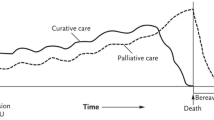Abstract
The number of children without a diagnosis in pediatric palliative home care and the process of decision-making in these children are widely unknown. The study was conducted as single-center retrospective cohort study. Between January 2013 and September 2016, 198 children and young adults were cared for; 27 (13.6%) of these were without a clear diagnosis at the start of pediatric palliative home care. A definite diagnosis was ultimately achieved in three children. Median age was 7 years (0–25), duration of care 569 days (2–2638), and number of home visits 7.5 (2–46). Most patients are still alive (19; 70.4%). Median number of drugs administered was eight (range 2–19); antiepileptics were given most frequently. Despite the lack of a clear diagnosis (and thus prognosis), 13 (48.1%) parents faced with their critically ill and clinically deteriorating children decided in favor of a DNAR order. Comparing this with 15 brain-injured children, signs, symptoms, and supportive needs were similar in both groups.
Conclusion: Children without a clear diagnosis are relatively common in pediatric palliative care and have—like all other patients—the right to receive optimized and symptom-adapted palliative care. Parents are less likely to choose treatment limitation for children who lack a definitive diagnosis.
What is Known: • A clear diagnosis is usually considered important for best-practice pediatric palliative care (PPC) including advanced care planning (ACP). • Timely initiation of pediatric palliative care (PPC) is highly recommended in children with life-limiting conditions. |
What is New: • SWAN (syndrome without a name) children show similar signs and symptoms (mostly neurological) and have similar supportive needs as brain-injured children. • Defining treatment limitations in advance care planning is more difficult for parents of SWAN compared to brain-injured children. |



Similar content being viewed by others
Abbreviations
- ACP:
-
Advanced care planning
- ACT:
-
Association for Children with Life-Limiting and Life-Threatening Conditions and their families
- PaPaS Scale:
-
Pediatric Palliative Screening Scale
- PPC:
-
Pediatric palliative care
- PPCT:
-
Pediatric palliative care team
- SWAN:
-
Syndrome without a name
References
ACT. A Guide to the Development of Children’s Palliative Care Services.pdf
Beecham E, Oostendorp L, Crocker J, Kelly P, Dinsdale A, Hemsley J, Russell J, Jones L, Bluebond-Langner M (2016) Keeping all options open: Parents’ approaches to advance care planning. Health expectations : an international journal of public participation in health care and health policy
Bergstraesser E, Hain RD, Pereira JL (2013) The development of an instrument that can identify children with palliative care needs: the Paediatric Palliative Screening Scale (PaPaS Scale): a qualitative study approach. BMC palliative care 12:20
Bergstraesser E, Paul M, Rufibach K, Hain RD, Held L (2013) The Paediatric Palliative Screening Scale: further validity testing. Palliat Med 28:530–533
care. AAoPSohapmacoh (2013) Pediatric Palliative Care and Hospice Care Commitments, Guidelines, and Recommendations. Pediatrics 132:966–972
Craig F, Abu-Saad Huijer H, Benini F, Kuttner L, Wood C, Feraris PC, Zernikow B (2008) IMPaCCT: standards of paediatric palliative care. Schmerz 22:401–408
Davies B, Sehring SA, Partridge JC, Cooper BA, Hughes A, Philp JC, Amidi-Nouri A, Kramer RF (2008) Barriers to palliative care for children: perceptions of pediatric health care providers. Pediatrics 121:282–288
Groh G, Borasio GD, Nickolay C, Bender HU, von Luttichau I, Fuhrer M (2013) Specialized pediatric palliative home care: a prospective evaluation. Journal of palliative medicine 16:1588–1594
Hammes BJ, Klevan J, Kempf M, Williams MS (2005) Pediatric advance care planning. Journal of palliative medicine 8:766–773
Johnson CE, Girgis A, Paul CL, Currow DC (2008) Cancer specialists’ palliative care referral practices and perceptions: results of a national survey. Palliat Med 22:51–57
Kuhlen M, Holl JI, Sabir H, Borkhardt A, Janssen G (2016) Experiences in palliative home care of infants with life-limiting conditions. European journal of pediatrics 175:321–327
Liben S, Papadatou D, Wolfe J (2008) Paediatric palliative care: challenges and emerging ideas. Lancet 371:852–864
Lotz JD, Jox RJ, Borasio GD, Fuhrer M (2015) Pediatric advance care planning from the perspective of health care professionals: a qualitative interview study. Palliat Med 29:212–222
Melvin CS, Oldham L (2009) When to refer patients to palliative care: triggers, traps, and timely referrals. Journal of Hospice & Palliative Nursing 11:291–301
Midson R, Carter B (2010) Addressing end of life care issues in a tertiary treatment centre: lessons learned from surveying parents’ experiences. Journal of child health care : for professionals working with children in the hospital and community 14:52–66
Vollenbroich R, Duroux A, Grasser M, Brandstatter M, Borasio GD, Fuhrer M (2012) Effectiveness of a pediatric palliative home care team as experienced by parents and health care professionals. Journal of palliative medicine 15:294–300
Wentlandt K, Krzyzanowska MK, Swami N, Rodin GM, Le LW, Zimmermann C (2012) Referral practices of oncologists to specialized palliative care. Journal of clinical oncology : official journal of the American Society of Clinical Oncology 30:4380–4386
Acknowledgements
The authors thank the families for confiding in the PPC team, all members of the palliative care team Duesseldorf for their deep commitment, and the “Elterninitiative Kinderkrebsklinik Duesseldorf e.V.” for long-standing financial support.
Funding
This work was supported by the Elterninitiative Kinderkrebsklinik e.V. Duesseldorf.
Author information
Authors and Affiliations
Contributions
JIH designed the study and drafted the manuscript. JW performed data analysis. GG, LT, SB, and PTO cared for the patients and acquired data. AB critically reviewed and revised the manuscript. GJ conceptualized the study, filled in the PaPaS Scale, and supervised data collection. MK conceptualized and designed the study, supervised data analysis, and drafted the manuscript. All authors approved the final manuscript as submitted and agree to be accountable for all aspects of the work.
Corresponding author
Ethics declarations
Conflict of interest
The authors declare that they have no conflict of interest.
Informed consent
Informed consent was obtained from the parents and legal guardians respectively.
Additional information
Communicated by Mario Bianchetti
Rights and permissions
About this article
Cite this article
Hoell, J.I., Warfsmann, J., Gagnon, G. et al. Palliative care for children with a yet undiagnosed syndrome. Eur J Pediatr 176, 1319–1327 (2017). https://doi.org/10.1007/s00431-017-2991-z
Received:
Revised:
Accepted:
Published:
Issue Date:
DOI: https://doi.org/10.1007/s00431-017-2991-z




